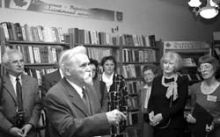Students at the city’s higher schools study the Ukrainian language and literature at a special chair of the Mariupol Humanities Institute (MHI), and at the Ukrainian Studies Chair of the Pryazovsky State Technical University (PSTU). Recently, students of the PSTU humanities department won second place in the Petro Jacyk International Contest in the Ukrainian Language for Donetsk oblast. They would have shown an even better performance but for want of books. This author visited all the downtown bookstores and found a Ukrainian book, Shevchenko’s Kobzar, in only one of them, selling at twenty hryvnias. The ethnic Ukrainian community of Canada learned about the disastrous shortage of Ukrainian literature in the eastern and southern regions of Ukraine and decided to help.
Ukrainian-Canadians set up a benevolent Friends of Ukraine Society assisted by Canadian and Ukrainian scholars, political and cultural figures, and aimed at the national revival, democratic, and economic development of Ukraine. The society has a noble mission, making a large assortment of printed matter, issued in the West and never censored, available to all popular strata. In eleven years the society had opened ten Canadian- Ukrainian library centers in Luhansk, Donetsk, Kharkiv, Simferopol, Odesa, Sevastopol, Chernihiv, Sumy, Dnipropetrovsk, and Poltava. The eleventh center was opened in Mariupol, at the Korolenko Central City Library where the Toronto office of the Friends of Ukraine Society donated 5,000 books and magazines, including publications on Ukrainian history, culture, language studies, library studies, art criticism, economics, religion, philosophy, fiction, music, etc. It was thus that Taras Shevchenko, Marko Vovchok, Panas Myrny, and Lesia Ukrayinka returned to us from overseas. Some of those addressing the opening ceremony pointed to a paradox: the Ukrainian state should take care of its children and language within and without this country [and not those living abroad]. Perhaps this paradox is the result of a very specific policy, or rather politicking centered on the language issue. As it is, Ukraine is placed last among European countries in terms of books published in the official language.
Those present at the opening ceremony were addressed by the godfathers of the benevolent mission in Ukraine: writer Stepan Horlach, chairman of the society, Mykola Kolodka, chairman of the project Canadian-Ukrainian Library Center, his deputy Yaroslav Senchyshen, Maria Fischer-Stryzh, member of the council and project sponsor. Clergymen of the Kyiv Patriarchate performed the consecration rite. Mr. Kolodka read a message of greetings from Canadian Premier Jean Chr О tien. Delegates from the Mariupol Humanities Institute Ukrainian Language Chair donated to the center their own papers on the history of Ukrainian literature and culture. Korolenko Library Director Liudmyla Hurkova assured those present that all literature, except unique encyclopedic editions (meant for the reading hall) would be available for borrowing.







